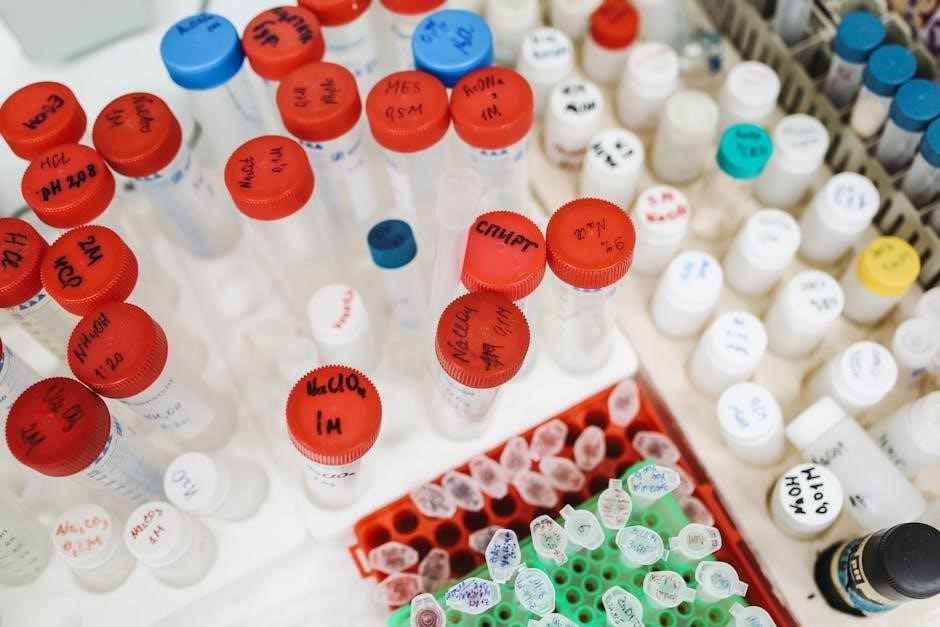The Combined Science GCSE is a comprehensive course covering Biology, Chemistry, and Physics, designed for students seeking a broad scientific understanding. It develops critical thinking, practical skills, and scientific literacy, preparing learners for future studies and careers. The course is assessed through exams and internal assessments, with a strong emphasis on applying scientific concepts to real-world scenarios. This revision guide provides essential resources to help students master the curriculum and achieve success in their exams.
1.1 Key Features of Combined Science GCSE
The Combined Science GCSE is a two-year course that integrates Biology, Chemistry, and Physics into a single qualification. It is available at both Foundation and Higher tiers, catering to a range of abilities. The course is divided into modules, with each science subject covering core topics such as cell biology, chemical changes, and energy; Practical skills are also assessed, with experiments and data analysis forming a key part of the curriculum. The exams are structured to test both knowledge and application, with a focus on real-world contexts. Revision guides and past papers are essential tools for preparation, as they help students familiarize themselves with exam formats and identify areas for improvement. This holistic approach ensures students gain a balanced understanding of science, making it an ideal option for those pursuing STEM careers or further education.
1.2 Importance of Revision for Combined Science GCSE
Revision is crucial for success in the Combined Science GCSE, as it helps students master the comprehensive curriculum and prepare for exams. Regular review of key concepts, such as cell biology, chemical changes, and energy, ensures a strong foundation. Past papers and revision guides, like those from BBC Bitesize and CGP, provide valuable practice and familiarize students with exam formats. Effective revision strategies, such as active recall and spaced repetition, enhance retention and understanding. Additionally, identifying and addressing weak areas through revision enables targeted improvement. With the integrated nature of Combined Science, consistent revision across all three subjects is essential to achieve a balanced and high-level understanding. By dedicating time to thorough revision, students can build confidence and perform at their best in the final exams.

Biology Revision
Biology revision focuses on key topics like cell biology, genetics, and ecosystems. Understanding processes like photosynthesis and inheritance is vital. Practical skills and past paper questions enhance exam readiness.
2.1 Cell Biology and Organisation
Cell biology is a fundamental topic in Combined Science GCSE, focusing on the structure and function of cells. Students learn about cell membranes, organelles, and transport mechanisms like diffusion and active transport. Understanding how cells divide through mitosis and meiosis is crucial, as well as the role of stem cells. The organisation of cells into tissues and organs is explored, including how systems like the digestive and circulatory systems function. Practical skills, such as microscope work and cell counting, are also assessed. Revision resources, including diagrams and past paper questions, help consolidate knowledge. Mastering cell biology provides a strong foundation for understanding more complex biological processes later in the curriculum.
2.2 Genetics and Evolution
Genetics and evolution are key topics in Combined Science GCSE, exploring heredity and biodiversity. Students learn about DNA structure, gene expression, and Mendel’s laws of inheritance. Understanding monohybrid and dihybrid crosses, along with genetic disorders like cystic fibrosis, is essential. Evolution concepts include natural selection, speciation, and evidence from fossils and genetics. Practical skills involve analyzing Punnett squares and pedigree charts. Revision resources, such as diagrams and case studies, aid in grasping these concepts. Mastering genetics and evolution is vital for understanding how life adapts and diversifies over time. Past paper questions and revision guides provide valuable practice for exam success.

Chemistry Revision
Chemistry revision covers foundational topics like the Periodic Table, chemical changes, and reactions. Acids, bases, salts, and practical experiments are key areas. Understanding these concepts is crucial for success.
3.1 The Periodic Table and Chemical Changes
The Periodic Table is a fundamental tool in Chemistry, organizing elements by atomic number and properties. Students learn to identify groups, periods, and transitions, understanding patterns in atomic structure. Chemical changes involve reactions, such as synthesis, decomposition, and displacement, with attention to conservation of mass and chemical equations. Key concepts include reactivity series, acids, and bases, as well as energy changes during reactions. Practical experiments, like testing metals with acids, reinforce theoretical knowledge. Revision guides recommend creating flashcards for element symbols and practicing balancing equations. Past papers highlight common questions on predicting reaction products and understanding periodic trends. Mastering these areas is essential for tackling higher-level topics and achieving exam success.
3.2 Acids, Bases, and Salts
Acids, bases, and salts are essential concepts in Chemistry, focusing on their properties and reactions. Acids are substances that donate hydrogen ions (H⁺), while bases accept them, forming salts and water in neutralization reactions. The pH scale measures acidity and basicity, with acids below 7 and bases above. Common acids include hydrochloric acid (HCl) and sulfuric acid (H₂SO₄), while sodium hydroxide (NaOH) is a strong base. Salts, such as sodium chloride (NaCl), result from acid-base reactions. Key reactions involve acids with metals, carbonates, and alkalis. Practical experiments, like testing acids and bases with litmus and phenolphthalein, are vital for understanding. Revision guides suggest creating diagrams of the pH scale and practicing writing chemical equations. Past papers often test knowledge of neutralization and salt formation, making these areas critical for exam success.
Physics Revision
Physics revision focuses on energy, forces, and electricity. Key topics include energy transfer, conservation, and efficiency, as well as forces and motion. Practical experiments and calculations are essential. Understanding circuits, resistance, and voltage is crucial for electricity. Past papers and concept maps can aid revision. Use BBC Bitesize and CGP guides for structured learning. Focus on applying concepts to real-world scenarios for better understanding and exam success.
4.1 Energy and Electricity
Energy and electricity are fundamental concepts in physics, focusing on energy transfers, conservation, and efficiency. Key topics include energy sources, renewable energy, and the national grid. Understanding energy calculations, such as energy transfer equations and efficiency formulas, is crucial. Electricity revision covers circuits, resistance, voltage, and Ohm’s Law. Students should practice analyzing series and parallel circuits, calculating total resistance, and solving voltage division problems. Past papers and revision guides, like CGP and BBC Bitesize, provide valuable practice questions. Additionally, exploring real-world applications, such as energy storage and electrical safety, enhances understanding. Regular practice with past exam questions and using concept maps can help students master these topics effectively.
4.2 Particle Physics and Forces
Particle physics explores the fundamental building blocks of matter, such as quarks and leptons, and their interactions. Forces, including gravity, electromagnetism, the strong nuclear force, and the weak nuclear force, shape how particles behave. Gravity, the weakest force, acts over long distances, while the strong force binds protons and neutrons in nuclei. Electromagnetism affects charged particles, and the weak force drives radioactive decay. Concepts like wave-particle duality explain how particles like electrons exhibit both wave and particle properties, as seen in the photoelectric effect. The structure of matter, from atoms to subatomic particles, reveals how quarks form protons and neutrons. Exchange particles like photons and gluons mediate forces, illustrating interactions. For revision, use diagrams to visualize particle interactions, employ flashcards for key terms, and practice past exam questions. Real-world applications, such as MRI machines using nuclear magnetic resonance, highlight relevance. Understanding experiments like Rutherford’s gold foil experiment and the Higgs boson discovery enriches learning. Addressing misconceptions, like gravity’s strength, clarifies concepts. Equations like Newton’s law of gravitation and Coulomb’s law apply forces to problems. Online simulations and cross-topic connections to energy and electricity aid comprehension. This section guides students from basic to complex ideas, offering practical revision strategies for exam success.

Revision Strategies and Resources
Effective revision strategies include active recall, spaced repetition, and practice past papers. Utilize CGP revision guides, BBC Bitesize, and online tools for structured learning and practice questions.
5.1 Effective Revision Techniques
Effective revision techniques for Combined Science GCSE involve active learning strategies. Start with creating a study timetable to organize your topics. Use active recall by testing yourself regularly on key concepts. Spaced repetition helps reinforce memory over time. Engage with past papers to familiarize yourself with exam formats and timing. Flashcards are useful for memorizing definitions and formulas. Teach concepts to others or explain them aloud to deepen understanding. Incorporate visual aids like diagrams and mind maps to make complex topics clearer. Regular breaks and a healthy study environment are crucial to maintain focus; Combine these methods with practice questions from revision guides to ensure comprehensive preparation for your exams.
5.2 Recommended Revision Guides and Tools
For effective revision, utilize trusted guides and tools tailored for Combined Science GCSE. CGP Revision Guides are highly recommended, offering clear explanations and practice questions. BBC Bitesize provides free online resources, including videos, quizzes, and study guides. Study Mind offers topic-specific practice questions with mark schemes for self-assessment. MedlyAI.com is excellent for interactive lessons and past exam questions organized by specification points. Revision cards are handy for memorizing key terms and concepts. Online platforms like Tassomai offer structured learning paths and progress tracking. Combining these tools with consistent practice ensures a well-rounded preparation. These resources are designed to support your learning style and help you achieve success in your exams.

Practice and Past Papers
Regular practice with past papers is crucial for exam success, helping students familiarize themselves with question formats and time management. Schools often provide exam question banks for revision.
6.1 Practising with Past Exam Papers
Practising with past exam papers is an essential part of revision for Combined Science GCSE. It helps students become familiar with the exam format, question types, and time management. By working through past papers, learners can identify their strengths and weaknesses, allowing them to focus their revision more effectively. Many schools provide access to past papers, and resources like BBC Bitesize and CGP revision guides offer additional practice materials. Students should aim to simulate exam conditions when practising, such as timing themselves and avoiding notes. Reviewing answers and mark schemes helps improve understanding and reduces common mistakes. Regular practice builds confidence and ensures students are well-prepared for the actual exams.
6.2 Analyzing Exam Results and Weak Areas
Analyzing exam results and identifying weak areas is crucial for effective revision. By reviewing past exam performance, students can pinpoint topics and question types where they struggle. Tools like BBC Bitesize and Study Mind offer detailed mark schemes and practice questions to help students understand their mistakes. Weak areas should be prioritized in revision plans, with targeted study sessions and additional practice. Revision guides and resources, such as CGP books, provide focused support for challenging topics. Regular self-assessment and feedback from teachers can further refine study strategies. By addressing weaknesses systematically, students can build confidence and improve their overall performance in Combined Science GCSE exams. This focused approach ensures no gaps in understanding and maximizes progress toward achieving desired grades.
